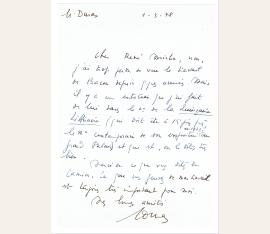French novelist, playwright, scriptwriter, essayist and experimental filmmaker (1914-1996). Autograph letter signed. no place. 8vo. 1 page. With holograph envelope.
3.500 €
(72462)
To René Micha in Bruxelles about Francis Bacon: „[…] non, j ’ai pas trop perdu de vue le travail de Bacon depuis quelques années. Mais il y a un entretien que j ’ai fait de lui dans le n° de la Quinzaine Littéraire (qui doit être à 15 jours près [en 1973 ?] le n° contemporain de son exposition au Grand Palais) et qui est, on le dit, très bien. Merci de ce que vous dites du Camion. Ce que vous pensez de mon travail est toujours très important pour moi […]“ - She is best known for writing the 1959 film Hiroshima mon amour, which earned her a nomination for Best Original Screenplay at the Academy Awards.
Duras was the author of many novels, plays, films, interviews, essays and short fiction, including her best-selling, highly fictionalized autobiographical work L'Amant (1984), translated into English as The Lover, which describes her youthful affair with a Chinese man. This text won the Goncourt prize in 1984. The story of her adolescence also appears in three other forms: The Sea Wall, Eden Cinema and The North China Lover. A film version of The Lover, produced by Claude Berri and directed by Jean-Jacques Annaud, was released to great success in 1992. The Sea Wall was first adapted into the 1958 film This Angry Age by René Clément, and again in 2008 by Cambodian director Rithy Panh as The Sea Wall. Other major works include Moderato Cantabile, also made into a film of the same name, Le Ravissement de Lol V. Stein, and her play India Song, which Duras herself later directed as a film, also titled India Song (1975). She was also the screenwriter of the 1959 French film Hiroshima mon amour, which was directed by Alain Resnais. Duras's early novels were fairly conventional in form (their 'romanticism' was criticised by fellow writer Raymond Queneau); however, with Moderato Cantabile she became more experimental, paring down her texts to give ever-increasing importance to what was not said. She was associated with the Nouveau roman French literary movement, although she did not belong definitively to any group. Many of her works, such as Le Ravissement de Lol V. Stein (1964) and L'Homme assis dans le couloir (1980) deal with human sexuality. Her films are also experimental in form; most eschew synchronized sound, using voice over to allude to, rather than tell, a story; spoken text is juxtaposed with images whose relation to what is said may be more-or-less indirect..

